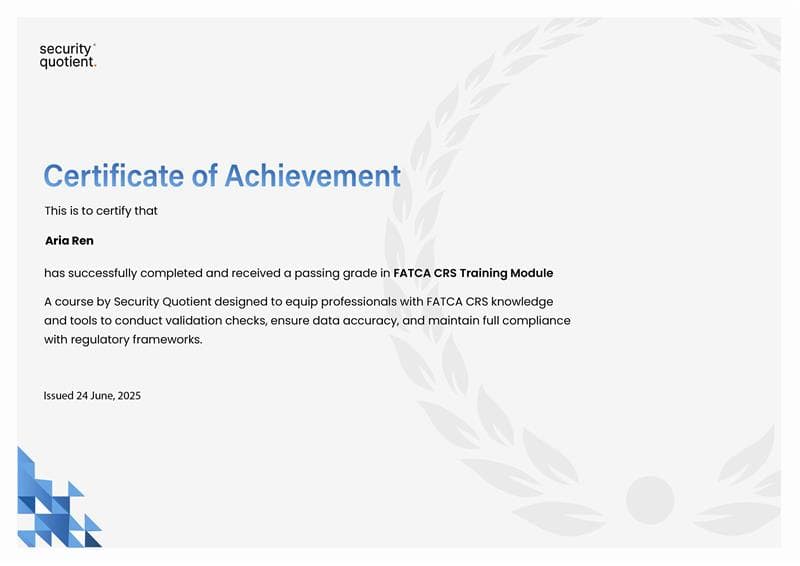Banks & Financial Institutions in the UAE
FATCA CRS Training for Employees
This comprehensive course provides a detailed understanding of FATCA and CRS regulations, focusing on key areas such as self-certification, document requirements, and mandatory information for reporting. Equip employees with the tools to perform validation checks and maintain accurate FATCA-CRS reporting to avoid penalties and ensure global regulatory compliance.
Start a Free Trial
Why choose FATCA training for your organization?
Strengthen compliance with global reporting standards.
Reduce financial and reputational risks through accurate validation and timely reporting.
Enhance internal controls with clear processes for documentation and due diligence.
Build in-house expertise to stay ahead of evolving regulations.

Key Learning Outcomes for Employees
Who in Your Workforce Should Take This Course?
Recommended for:
Compliance Officers
Professionals responsible for ensuring the organization meets FATCA and CRS obligations, maintains regulatory standards, and mitigates compliance risks.
Operations Teams
Employees involved in account onboarding, documentation collection, and day-to-day maintenance of customer records requiring FATCA-CRS information.
Relationship Managers & Frontline Staff
Team members who interact directly with clients and collect self-certification forms, ensuring accurate information is obtained at the point of onboarding.
Risk & Internal Audit Teams
Personnel tasked with monitoring internal controls, validating data accuracy, and ensuring compliance frameworks are effectively implemented.
Finance and Reporting Teams
Staff responsible for compiling, validating, and submitting FATCA-CRS reports to relevant authorities, ensuring timely and accurate regulatory filings.
Course Details
Course Content
Section 1: Introduction to FATCA and CRS
This section introduces the Foreign Account Tax Compliance Act (FATCA) and the Common Reporting Standard (CRS) from both regulatory and operational perspectives. It explains their significance in the UAE banking sector and why compliance with international tax transparency standards is crucial. Employees will gain an understanding of the regulatory frameworks, the objectives behind FATCA and CRS, and their impact on financial institutions operating in a global environment. The section also highlights the roles and responsibilities of staff in ensuring compliance and avoiding regulatory breaches.
Section 2: Self-Certification and Documentation Requirements
Employees will learn to determine the information and documentation required to evidence and support FATCA and CRS declarations for account holders. This section explores the purpose of self-certification, when it must be collected, and the different types of self-certification forms used for various account holder types. Practical guidance is provided on validating the accuracy of information presented in self-certification forms and identifying the mandatory data points required for FATCA-CRS reporting. Real examples help illustrate common errors and best practices for accurate data collection.
Section 3: Customer Due Diligence (CDD) and KYC Obligations
This section provides a comprehensive overview of Know Your Customer (KYC) and Customer Due Diligence (CDD) measures, which are critical to FATCA and CRS compliance. Employees will learn the importance of proper customer and beneficial ownership identification and how these processes align with tax reporting requirements. The section covers:
- Identification of Politically Exposed Persons (PEPs) and related money laundering and corruption risks.
- An introduction to FAB’s Customer Risk Assessment Methodology (CRAM) and the types of due diligence applied.
- Periodic reviews and ongoing due diligence requirements to maintain accurate and up-to-date information.
Section 4: Suspicious Transaction Reporting (STR) and AML/CFT Alignment
In this section, employees receive guidance on identifying and reporting suspicious transactions in alignment with AML/CFT regulations in the UAE. Key topics include:
- How to identify suspicious activity and report it through the correct channels.
- Staff roles and responsibilities in monitoring transactions and escalating concerns.
- New STR guidelines as per the Central Bank of the UAE (CB UAE).
- Common indicators and typologies used to detect AML/CFT concerns in relation to FATCA and CRS compliance.
Section 5: Summary and Assessment
The final section consolidates the knowledge gained throughout the course, reinforcing the importance of accurate self-certification, robust KYC/CDD measures, and proactive suspicious activity reporting. Employees will complete a short quiz to assess their understanding of FATCA-CRS obligations and reporting processes. Upon successful completion, learners will receive a certificate of completion, demonstrating their competency in FATCA-CRS compliance and their commitment to upholding international regulatory standards within the UAE banking environment.

Certification for Successful Learners
Recognize and celebrate your employees’ commitment to cybersecurity with an official certificate — personalized and company-branded.
Earn the Credential
Digital & Shareable
Company-Branded Certificate*
Drive Engagement
How to Get This Course
Licensing Option (with customization)
Customize this course with your company’s specific fraud policies, reporting procedures, and branding. Host it on your own Learning Management System (LMS) for full control and flexibility.
Subscription Option (no customization)
Access the standard version of the course immediately via Security Quotient’s LMS—ideal for organizations looking for a quick rollout.
Hybrid Option
Customize the content to your needs while using our platform for delivery, usage tracking, and administrative controls.
Build from Scratch
Need a specialized FATCA, CRS training solution? We’ll work closely with you to create a fully customized course that addresses your unique operational risks, regional regulations, and organizational needs.
Frequently Asked Questions
Who should take the FATCA-CRS training course?
This course is designed for employees in compliance, operations, risk management, onboarding, and relationship management roles within financial institutions in the UAE. CISOs and senior leadership teams will also benefit from understanding the data handling, regulatory obligations, and reporting processes to ensure appropriate security and governance measures are in place.
How does this course support regulatory compliance in the UAE?
The course aligns with UAE regulatory requirements and international tax transparency standards, including FATCA and CRS frameworks. It provides practical guidance on self-certification, KYC/CDD, suspicious transaction reporting (STR), and data validation procedures. This helps organizations mitigate compliance risks and avoid penalties from regulatory authorities.
Does the training cover data security and information handling requirements for FATCA and CRS reporting?
Yes. While the course focuses primarily on regulatory obligations, it also highlights the importance of secure data collection, storage, and transmission of customer information. CISOs will gain clarity on the type of data collected, mandatory fields, and the points where security controls must be applied to ensure confidentiality, integrity, and compliance with UAE data protection regulations.
What practical skills or outcomes can participants expect after completing the FATCA-CRS training?
Participants will gain a clear understanding of how to identify reportable accounts, validate tax residency information, and manage customer self-certifications in line with FATCA and CRS requirements. The course also equips attendees with the ability to apply due diligence procedures, interpret regulatory updates, and implement effective internal controls to ensure ongoing compliance. By the end of the training, participants will be able to confidently support their institution’s reporting and governance obligations under UAE and international standards.
What impact does fraud prevention training have on our organization’s reputation and customer trust?
In the UAE's highly competitive financial market, maintaining a reputation for integrity is essential for business success. By investing in fraud risk management training, you demonstrate to your customers, regulators, and stakeholders that your organization is committed to safeguarding against fraud. This not only helps mitigate financial losses but also enhances trust and credibility, especially in sectors like banking and insurance, where compliance and security are paramount.
